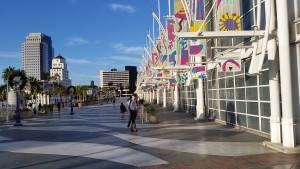On November 21st, 2014, I was humbled by the opportunity to travel to Long Beach, California to present my research on Anchoring Autobiographical Memories at two conferences: The Psychonomic Society and the Society for Judgment and Decision Making. They were international conferences, attracting over 3000 presenters worldwide. I received $1500 in funding and a third of that funding came from the School of Humanities and Social Sciences’ Dean’s Excellence Fund.
The experience of attending that conference affected me on a personal, professional and social level. Personally, the opportunity to attend a conference where I was one of the youngest people allowed me to discover the hybrid world of adulthood. I saw some of the most brilliant scholars in the field eating, drinking and conversing with people about all kinds of topics. I was able to reflect deeply on what it means to me to be accomplished in the field and what kind of person I want to be. I had the opportunity to talk to those scholars, and PhD students, about what made their life meaningful, what they are striving to achieve and what they thought of the conference experience. I am someone who appreciates depth and self-reflection and almost all of the people I met shared some event in their life that piqued their interest in their field. They wanted to know more about themselves and they decided to investigate how other people conducted their lives to find an adequate answer for themselves. They wanted to help, both themselves and other people, and it was truly humbling to see that the same honorable motivation was maintained throughout the course of a career. I talked to the other conference attendees on such a cordial and open level that I have kept those contacts to date.
The greatest privilege was the involvement in the professional world. Every student needs to be exposed to real people in their field. The value of meeting young professionals and seasoned veterans cannot be understated. You are able to see the people behind the academic role and you are able to better appreciate the research and the complexities of the questions being explored. You start to see the curiosity that enchants people and charms them throughout the course of their lives. You see that certain factors of brilliance are constant and that they are common in the young and old alike. 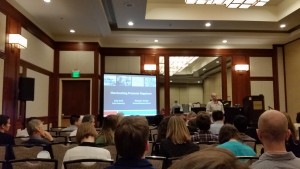 As the only College of Charleston student attending either conference, I wanted to meet the students and faculty from other universities and see the kinds of research they were conducting. Students are not aware of the importance of mentorship, or the effects of good mentorship, until you are exposed to an environment where you are no longer just a student- you are a presenter of relatively equal status as the other people. You have your area of expertise and you have to defend your academic ground and the mettle of your research. I always knew the value of the mentorship I have received from Dr. Daniel Greenberg and Dr. Anthony Bishara over the last year and a half. Yet, the jump between knowing this in theory and seeing the fruits of their academic and professional nurturance was made at this conference. I explained our research to experts in the field who asked important and very specific questions. I spoke with other students who were starting research in the same area and all these experiences converged at a point of incredible value to my professional standing. I had never felt more prepared academically for a career in psychology or to pursue my education in graduate school as I did during and after the conference.
As the only College of Charleston student attending either conference, I wanted to meet the students and faculty from other universities and see the kinds of research they were conducting. Students are not aware of the importance of mentorship, or the effects of good mentorship, until you are exposed to an environment where you are no longer just a student- you are a presenter of relatively equal status as the other people. You have your area of expertise and you have to defend your academic ground and the mettle of your research. I always knew the value of the mentorship I have received from Dr. Daniel Greenberg and Dr. Anthony Bishara over the last year and a half. Yet, the jump between knowing this in theory and seeing the fruits of their academic and professional nurturance was made at this conference. I explained our research to experts in the field who asked important and very specific questions. I spoke with other students who were starting research in the same area and all these experiences converged at a point of incredible value to my professional standing. I had never felt more prepared academically for a career in psychology or to pursue my education in graduate school as I did during and after the conference.
Aside from my focus on cognitive psychology, the most valuable course I had taken at the College of Charleston was Psychology 390 ‘Research Design and Interpretation’ with Dr. James Hittner. The course was on-going when I went to the conference but with the knowledge I had gained from it, I was able to impress several faculty from schools in New
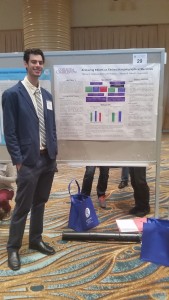 York, Delaware, California and Arizona with my understanding of advanced statistical methods, such as binary logistic regression and effect sizes. One professor from a university in New York, after 20 years of teaching, told me she did a course over the summer to learn and deepen her knowledge of binary and multiple logistic regression and she was amazed that an undergraduate student had this level of knowledge that some faculty do not possess. Students need to learn the value of their classes by learning the practical applications of the material they are exposed to. Although I will not have a lay conversation about logistic regression, I cannot state the importance of knowing advanced statistics for graduate school in psychology. I abhorred statistics but when I saw the fruits of my hard work and seeing how much people valued the knowledge I had attained, I felt one of most tangible sensations of accomplishment of my life. I could read and understand every poster, read between the lines of every statistic and ask people genuinely helpful questions about their methods so we could guide each other for potential future research.
York, Delaware, California and Arizona with my understanding of advanced statistical methods, such as binary logistic regression and effect sizes. One professor from a university in New York, after 20 years of teaching, told me she did a course over the summer to learn and deepen her knowledge of binary and multiple logistic regression and she was amazed that an undergraduate student had this level of knowledge that some faculty do not possess. Students need to learn the value of their classes by learning the practical applications of the material they are exposed to. Although I will not have a lay conversation about logistic regression, I cannot state the importance of knowing advanced statistics for graduate school in psychology. I abhorred statistics but when I saw the fruits of my hard work and seeing how much people valued the knowledge I had attained, I felt one of most tangible sensations of accomplishment of my life. I could read and understand every poster, read between the lines of every statistic and ask people genuinely helpful questions about their methods so we could guide each other for potential future research.
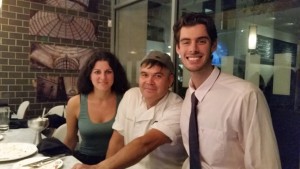 Upon arriving at the conference registration session, I met a PhD student group from the University of Pennsylvania. Bradford Tuckfield, the runner-up in the 2013 student poster competition, was one of the students and he gave me a brief introduction to conference life. He told me that there were two types of conference goers: the majority of people who were shy and were only there for the research and the minority, the social butterflies who cannot get enough of the networking opportunities. He was the former. After meeting him and his group, I began talking to some Turkish, Dutch and German students who were part of a foreign exchange program to Stanford University. All of the Stanford students, domestic and international, myself and
Upon arriving at the conference registration session, I met a PhD student group from the University of Pennsylvania. Bradford Tuckfield, the runner-up in the 2013 student poster competition, was one of the students and he gave me a brief introduction to conference life. He told me that there were two types of conference goers: the majority of people who were shy and were only there for the research and the minority, the social butterflies who cannot get enough of the networking opportunities. He was the former. After meeting him and his group, I began talking to some Turkish, Dutch and German students who were part of a foreign exchange program to Stanford University. All of the Stanford students, domestic and international, myself and 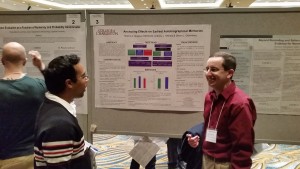 my roommate went to dinner together on the Friday night. The level of conversation and the ideas exchanged, as well as the contacts, was brilliant and a magnificent experience for me. I met students and faculty from NYU, UCLA, Cambridge, Oxford, Stanford, Harvard, Columbia and other places from all over the US and the world over the next few days while presenting my research and attending the networking events. I made so many important connections there, with people who are established in the field and PhD students full of groundbreaking ideas. Most of all, I never thought that I would leave a conference with new friends, people who I have kept in touch for the last two months.
my roommate went to dinner together on the Friday night. The level of conversation and the ideas exchanged, as well as the contacts, was brilliant and a magnificent experience for me. I met students and faculty from NYU, UCLA, Cambridge, Oxford, Stanford, Harvard, Columbia and other places from all over the US and the world over the next few days while presenting my research and attending the networking events. I made so many important connections there, with people who are established in the field and PhD students full of groundbreaking ideas. Most of all, I never thought that I would leave a conference with new friends, people who I have kept in touch for the last two months.
Attending those conferences brought a new kind of perspective to me and it reassured me, beyond any reasonable doubt, of the benefits of hard work. I dedicated over a year of my life to that research and I have devoted myself academically at the College of Charleston since I began my undergraduate career. I had, over the course of three brief days, all the recompense for my efforts and unwavering pursuit. This is an experience I will never forget and, most of all, I will never forget those individuals and departments at my beloved College of Charleston who believed in me and funded my travel.
Thank you!
-Marino
Marino Mugayar-Baldocchi is a senior in the Honor’s College majoring in psychology and minoring in religious studies. If you’d like to donate to the HSS Dean’s Excellence Fund, go here.
